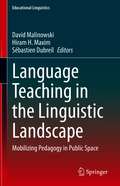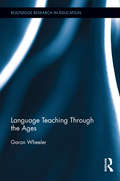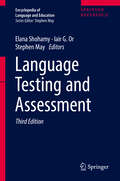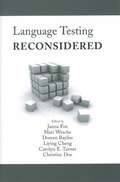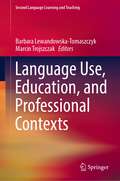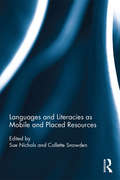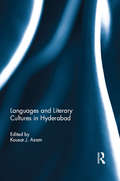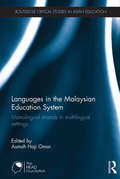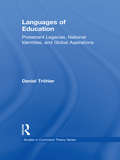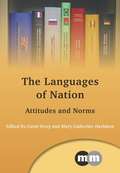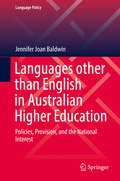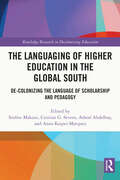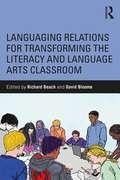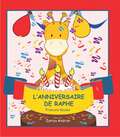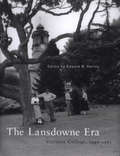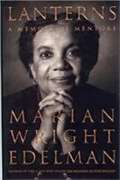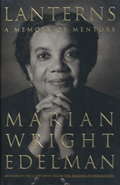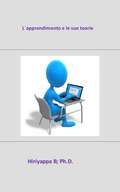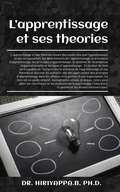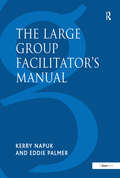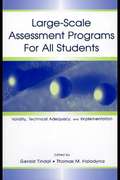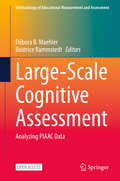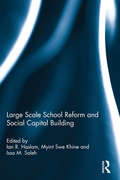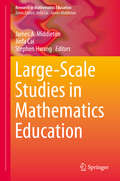- Table View
- List View
Language Teaching in the Linguistic Landscape: Mobilizing Pedagogy in Public Space (Educational Linguistics #49)
by David Malinowski Hiram H. Maxim Sébastien DubreilThis book builds upon the growing field of Linguistic Landscape in order to demonstrate the power of a spatialized approach to language, culture, and literacy education as it opens classrooms and cultivates new competencies. The chapters develop major themes, including re-imagining language curricula, language classrooms, and schoolscapes in dialogue with the heteroglossic discourses of the local; developing L2 learners’ symbolic, translingual competencies through engagement with situated, multimodal texts; fostering critical social awareness through language study in the linguistic landscape; expanding opportunities for situated L2 reading and writing; and cultivating language students’ capacities for engaged scholarship and research in out-of-class contexts.By exploring the pedagogical possibilities of place-based approaches to literacy development, this volume contributes to the reimagining of language education through the linguistic landscape.
Language Teaching Through the Ages (Routledge Research in Education #93)
by Garon WheelerKonrad Koerner, a leading historian of linguistics, has long said that an academic field cannot be considered to have matured until it has history as one of its subfields. The history of linguistics is a growing area, having come into its own in the 1960s, especially after Noam Chomsky looked for historical roots for his work. In contrast, the history of language teaching has been neglected, reflecting the insecurity and youth of the field. Most works on the subject have been written by linguists for other linguists, and typically focus on a specific period or aspect of history. This volume concentrates on the basic issues, events, and threads of the history of the field - from Mesopotamia to the present - showing how a knowledge of this history can inform the practice of language teaching in the present.
Language Testing and Assessment
by Elana Shohamy Iair G. Or Stephen MayIn this third, fully revised edition, the 10 volume Encyclopedia of Language and Education offers the newest developments, including an entirely new volume of research and scholarly content, essential to the field of language teaching and learning in the age of globalization. In the selection of topics and contributors, the Encyclopedia reflects the depth of disciplinary knowledge, breadth of interdisciplinary perspective, and diversity of socio-geographic experience in the language and education field. Throughout, there is an inclusion of contributions from non-English speaking and non-western parts of the world, providing truly global coverage. Furthermore, the authors have sought to integrate these voices fully into the whole, rather than as special cases or international perspectives in separate sections. The Encyclopedia is a necessary reference set for every university and college library in the world that serves a faculty or school of education, as well as being highly relevant to the fields of applied and socio-linguistics. The publication of this work charts the further deepening and broadening of the field of language and education since the publication of the first edition of the Encyclopedia in 1997 and the second edition in 2008.
Language Testing Reconsidered (Actexpress)
by Janna Fox Mari Wesche Doreen BaylissLanguage Testing Reconsidered provides a critical update on major issues that have engaged the field of language testing since its inception. Anyone who is working in, studying or teaching language testing should have a copy of this book. The information, discussions, and reflections offered within the volume address major developments within the field over the past decades, enlivened by current "takes" on these issues. The real value of this collection, however, lies in its consideration of the past as a means of defining the future agenda of language testing.
Language Use, Education, and Professional Contexts (Second Language Learning and Teaching)
by Barbara Lewandowska-Tomaszczyk Marcin TrojszczakThis present book addresses language and its diverse forms in an array of professional and practical contexts. Besides discussing the intricacies of specialized settings such as legal, medical, technical or corporate, the collection also focuses on the role of education in relation to professional contexts ranging from challenges in professional university teaching and translation didactics to business environment requirements.
Language, Youth and Identity in the 21st Century
by Jacomine Nortier Bente A. SvendsenThe language of young people is central in sociolinguistic research, as it is seen to be innovative and a primary source of knowledge about linguistic change and the role of language. This volume brings together a team of leading scholars to explore and compare linguistic practices of young people in multilingual urban spaces, with analyses ranging from grammar to ideology. It includes fascinating examples from cities in Europe, Africa, Canada and the US to demonstrate how young people express their identities through language, for example in hip-hop lyrics and new social media. This is the first book to cover the topic from a globally diverse perspective, and it investigates how linguistic practices across different communities intersect with age, ethnicity, gender and class. In doing so it shows commonalities and differences in how young people experience, act and relate to the contemporary social, cultural and linguistic complexity of the twenty-first century.
Languages and Literacies as Mobile and Placed Resources
by Sue Nichols Collette SnowdenLanguages and Literacies as Mobile and Placed Resources explores how languages and literacies are implicated in the complex relationship between place and mobility. It is a book that represents the next wave in literacy studies in which theories of mobility, networking and globalisation have emerged to account for the dynamic landscape of globally circulating communication resources. Authors in this volume take up a more complex way of thinking about resources, applying it to consider languages and literacies as assemblages or as parts of assemblages that are involved in learning, teaching and meaning-making. The book addresses forms of text and mobility that arise in contexts outside of formal education including marketing, charity, journalism, community organisation and parenting. It also addresses school contexts and higher education settings. Key topics explored include: Consequences of workplace confinement Literacies as placed resources in the context of rural communities Literacy, sustainability and landscapes for learning Documenting networked knowledge on tablets Mobilising literacy policy through resources Global Englishes as placed resources Languages as contextualised resources Shaping a digital academic writing resource in a transcultural space With an international range of carefully chosen contributors, this book is a must read text for all academics interested in semiotics and literacy studies.
Languages and Literary Cultures in Hyderabad
by Kousar J. AzamThere is great interest in recent scholarship in the study of metropolitan cultures in India as evident from the number of books that have appeared on cities such as Delhi, Mumbai, Chennai and Kolkata. Though Hyderabad has a rich archive of history scattered in many languages, very few attempts have been made to bring this scholarship together. The papers in this volume bring together this scholarship at one place. They trace the contribution of different languages and literary cultures to the multicultural mosaic that is the city of Hyderabad How it has acquired this uniqueness and how it has been sustained is the subject matter of literary cultures in Hyderabad. This work attempts to trace some aspects of the history of major languages practiced in the city. It also reviews the contribution of the various linguistic groups that have added to the development not just of varied literary cultures, but also to the evolution of an inclusive Hyderabadi culture. The present volume, it is hoped, will enthuse both younger and senior scholars and students to take a fresh look at the study of languages and literary cultures as they have evolved in India's cities and add to the growing scholarship of metropolitan cultures in India.
Languages in the Malaysian Education System: Monolingual strands in multilingual settings (Routledge Critical Studies in Asian Education)
by Asmah Haji OmarThis book provides an overview of language education in Malaysia, covering topics such as the evolution of the education system from pre-independence days to the present time, to the typology of schools, and the public philosophy behind every policy made in the teaching of languages. The book consists of chapters devoted to the teaching of languages that form separate strands but are at the same time connected to each other within the education system. These chapters discuss: Implementing the national language policy in education institutions English in language education policies and planning in Malaysia Chinese and Tamil language education in Malaysia Teaching of indigenous Malaysian languages The role of translation in education in Malaysia It also discusses the development of language which enables the national language, Malay, to fulfil its role as the main medium of education up to the tertiary level. This book will be of interest to researchers studying language planning, teacher education and the sociology of education, particularly, within the Malaysian context.
Languages of Education: Protestant Legacies, National Identities, and Global Aspirations (Studies in Curriculum Theory Series)
by Daniel TröhlerIn this landmark contribution to the study of the formation of the modern school, Daniel Tröhler applies one of the most recognized methods of historical research to an analysis of the "language" of the academic discipline of education. Arguing the value of looking at languages rather than arguments--langues rather than paroles--this method of historical research is used to examine the background of different philosophies, theories, or arguments of education, specifically republicanism and Protestantism. Tröhler’s argument is that such analysis is essential to tracing back educational arguments to the ideological core of their concerns, and thus to understanding in international perspective the historical development of education systems and organizations and to evaluating their different theoretical and political approaches and claims. Elegantly written, with the historian’s attention to archival material, this book enables the reader to understand the complex and different social, cultural, religious, and political context factors embedded in the "thought" of schooling and its objects of scrutiny--its notions of the child and teacher. Languages of Education is essential reading for scholars and students across the fields of history and philosophy of education, curriculum studies, and comparative education.
The Languages of Nation
by Carol Percy Mary Catherine DavidsonThis collection brings together research on linguistic prescriptivism and social identities, in specific contemporary and historical contexts of cross-cultural contact and awareness. Providing multilingual and multidisciplinary perspectives from language studies, lexicography, literature, and cultural studies, our contributors relate language norms to frameworks of identity beyond monolingual citizenship - nativeness, ethnicity, politics, religion, empire. Some chapters focus on traditional instruments of prescriptivism: language academies in Europe; government language planners in southeast Asia; dictionaries and grammars from Early Modern and imperial Britain, republican America, the postcolonial Caribbean, and modern Germany. Other chapters consider the roles of scholars in prescriptivism, as well as the more informal and populist mechanisms of enforcement expressed in newspapers. With a thematic introduction articulating links between its breadth of perspectives, this accessible book should engage everyone concerned with language norms.
Languages other than English in Australian Higher Education: Policies, Provision, and the National Interest (Language Policy #17)
by Jennifer Joan BaldwinThis book researches the study of languages other than English, and their place in the Australian tertiary sector. Languages are discussed in the context of the histories of Australian universities, and the series of reports and surveys about languages across the second half of the twentieth century. It demonstrates how changes in the ethnic mix of society are reflected in language offerings, and how policies on languages have changed as a result of societal influences. Also discussed is the extent to which influencing factors changed over time depending on social, cultural, political and economic contexts, and the extent to which governments prioritised the promotion and funding of languages because of their perceived contribution to the national interest.The book will give readers an understanding as to whether languages have mattered to Australia in a national and international sense and how Australia’s attention to languages has been reflected in its identity and its sense of place in the world.
The Languaging of Higher Education in the Global South: De-Colonizing the Language of Scholarship and Pedagogy (Routledge Research in Decolonizing Education)
by Sinfree Makoni Cristine G. Severo Ashraf Abdelhay Anna Kaiper-MarquezBy foregrounding language practices in educational settings, this timely volume offers a postcolonial critique of the languaging of higher education and considers how Southern Epistemologies can be used to further the decolonization of post-secondary education in the Global South. Offering a range of contributions from diverse and minoritized scholars based in countries including South Africa, Rwanda, Sudan, Qatar, Turkey, Portugal, Sweden, India and Brazil, The Languaging of Higher Education in the Global South problematizes the use of language in various areas of higher education. Chapters demonstrate both subtle and explicit ways in which the language of pedagogy, scholarship, policy, and partcipiation endorse and privelege Western constructs and knowledge production, and utilize Southern theories and epistemologies to offer an alternative ways forward – practice and research which applies and promotes Southern epistemologies and local knowledges. The volume confronts issues including integrationism, epistemic solidarity, language policy and ideology, multilingualism, and the increasing use of technology in institutions of higher education. This innovative book will be of interest to researchers, scholars, and postgraduate students in the fields of higher education, applied linguistics, and multicultural education. Those with an interest in the decolonization of education and language will find the book of particular use.
Languaging Relations for Transforming the Literacy and Language Arts Classroom
by Richard Beach David BloomeApplying a languaging perspective, this volume frames the teaching and learning of literacy, literature, language, and the language arts as social and linguistic actions that generate new questions to make visible social, cultural, psychological, linguistic, and educational processes. Chapter authors explore diverse aspects of a languaging framework, the perspective of language as a series of ongoing and evolving interactional social actions and processes over time. Based on their research, the authors suggest directions for addressing substantive engagement as well as the marginalization, superficiality, and violence (symbolic and otherwise) that characterize the educational experience of so many students. Responding to the need to foster and support students’ intellectual, social, and affective worlds, this book showcases how languaging relations among teachers and students can deepen interactions and engagement with texts; enhance understandings of agency, personhood, and power relations in order to transform literacy, literature, and language arts classrooms; and improve the lives of teachers and students in educational settings.
L'anniversaire de Raphe (Junglidoux #4)
by Francois Keyser Caroline OrliacLes amis de Raphe la girafe organisent une fête mais ils ne l’ont pas invité, et lorsqu’il le découvre, il est très contrarié. Pourquoi ses amis feraient-ils une chose pareille ? Comme tous les livres de la collection des Junglidoux, celui-ci comporte une morale à destination des jeunes lecteurs : il faut toujours parler en connaissance de cause au lieu de s’imaginer des choses. Les Junglidoux représentent une opportunité formidable pour les parents de partager un moment privilégié avec leurs enfants en leur faisant la lecture et en leur expliquant les enseignements à tirer de chaque histoire. Le thème central de la collection est celui de l’unité dans la diversité à travers les personnages incarnés par différents animaux qui s’entraident pour surmonter les difficultés qu’ils rencontrent et leur amitié qui dépasse leurs différences. Les Junglidoux sont aussi l’occasion de sensibiliser les plus jeunes au problème des espèces menacées car chacun des héros représente un animal qui a une sous-espèce en voie d’extinction. Les livres des Junglidoux s’adressent aux enfants de 1 à 7 ans.
The Lansdowne Era
by Edward HarveyProviding background and context, and bringing together a multiplicity of voices, Edward Harvey documents how one Canadian college responded to the important developments of the time - post-war prosperity, rapid urbanization, massive expansion in post-secondary education, the "baby boom," the emergence of a "youth culture." Individual chapters by distinguished alumni reflect on the legacy of Dean Emeritus Peter Lawson Smith, discuss the buildings and architecture of the era, highlight initiatives to build the institution's art collection, and look at teaching from the perspective of a young faculty member.
Lanterns: A Memoir of Mentors
by Marian Wright EdelmanMemoir by founder of the Children's Defense Fund with portraits of the many mentors who helped shape her.
Lanterns
by Marian Wright EdelmanI am grateful beyond words for the example of the lanterns shared in this memoir whose lives I hope will illuminate my children's, your children's, and the paths of countless others coming behind.--Marian Wright Edelman, from the PrefaceMarian Wright Edelman, "the most influential children's advocate in the country" (The Washington Post), shares stories from her life at the center of this century's most dramatic civil rights struggles. She pays tribute to the extraordinary personal mentors who helped light her way: Martin Luther King, Jr., Robert F. Kennedy, Fannie Lou Hamer, William Sloane Coffin, Ella Baker, Mae Bertha Carter, and many others.She celebrates the lives of the great Black women of Bennettsville, South Carolina-Miz Tee, Miz Lucy, Miz Kate-who along with her parents formed a formidable and loving network of community support for the young Marian Wright as a Black girl growing up in the segregated South. We follow the author to Spelman College in the late 1950s, when the school was a hotbed of civil rights activism, and where, through excerpts from her honest and passionate college journal, we witness a national leader in the making and meet the people who inspired and empowered her, including Dr. Benjamin E. Mays, Howard Zinn, and Charles E. Merrill, Jr.Lanterns takes us to Mississippi in the 1960s, where Edelman was the first and only Black woman lawyer. Her account of those years is a riveting first-hand addition to the literature of civil rights: "The only person I recognized in the menacing crowd as I walked towards the front courthouse steps was [a] veteran New York Times reporter. He neither acknowledged me nor met my eyes. I knew then what it was like to be a poor Black person in Mississippi: alone." And we follow Edelman as she leads Bobby Kennedy on his fateful trip to see Mississippi poverty and hunger for himself, a powerful personal experience for the young RFK that helped awaken a nation's conscience to child hunger and poverty. Lanterns is illustrated with thirty of the author's personal photographs and includes "A Parent's Pledge" and "Twenty-five More Lessons for Life," an inspiration to all of us-parents, grandparents, teachers, religious and civic leaders-to guide, protect, and love our children every day so that they will become, in Marian Wright Edelman's moving vision, the healing agents for national transformation.
L´apprendimento e le sue teorie
by Hiriyappa B Barbara Vanni“L'apprendimento e le sue teorie” riguarda argomenti come l'apprendimento e le sue componenti, i determinanti dell'apprendimento, il processo di apprendimento, i principi dell´apprendimento, il sistema di ricompensa organizzativo e i tipi di apprendimento. Il lettore di questo libro sarà in grado di: comprendere il campo dell´apprendimento e le sue teorie e discutere lo scenario di applicazione reale dei principi dell´apprendimento negli affari e nella gestione di un'organizzazione. Questo libro è una guida selettiva, una monografia semplice e pratica progettata per aiutare i ricercatori e gli studenti di psicologia, educazione e gli studiosi di economia e gestione. L'apprendimento porta quei cambiamenti permanenti necessari a imparare e apprendere durante tutto l´arco della vita.
L'apprentissage et ses théories
by Berenice Arrieta Cortés Hiriyappa BL’apprentissage et ses théories couvre des sujets tels que l'apprentissage et ses composantes, les déterminants de l'apprentissage, le processus d'apprentissage, les principes d'apprentissage, le système de récompense organisationnelle et les types d'apprentissage. Ce lecteur de livre sera capable de: Comprendre le domaine de l'apprentissage et ses théories et discuter du scénario réel des applications des principes d'apprentissage dans les affaires et la gestion d'une organisation. Ce livre est un guide sélectif, monographie simple, pratique, conçu pour aider les chercheurs et les étudiants de la psychologie, l'éducation, la gestion et les études commerciales.
The Large Group Facilitator's Manual: A Collection of Tools for Understanding, Planning and Running Large Group Events
by Kerry Napuk Eddie PalmerMost organizations are adept at using small groups - witness the widespread use of teams. Yet, how do you work with 20 to 500 people at a time? How would you involve all stakeholders in a critical issue or the organization's future? How can you generate contributions, consensus and commitment from the bottom up? People want to contribute but often are frustrated through a lack of opportunity or means. Large Group Processes allow people to participate over things that matter to them. Participation leads to commitment and commitment to ownership. Working with large groups is relatively new, but these processes are proving very effective with positive outcomes. Audiences can be customized with stakeholders who might be inside or outside the organization, such as employees, customers, suppliers, shareholders, the general public and any other interested parties. Applications are wide-ranging, touching on almost every aspect of organizational life. The Large Group Facilitator's Manual offers you a blueprint for planning, preparing, running and reporting successful large group events. The authors walk you through six different processes from concept to step-by-step facilitation with sample invitations, checklists and even scripts. It is the first facilitator's guide to cover so many processes with such detailed instructions.
Large-scale Assessment Programs for All Students: Validity, Technical Adequacy, and Implementation
by Gerald Tindal Thomas M. HaladynaThe need for a comprehensive volume that reviews both the processes and issues involved in developing, administering, and validating large-scale assessment programs has never been greater. These programs are used for many purposes, including instructional program evaluation, promotion, certification, graduation, and accountability. One of the greatest problems we face is how to deal with special needs and bilingual populations. Examining these processes and issues is the mission of this book. It is organized into the following five sections: Introduction, Validity Issues, Technical Issues, Implementation Issues, and Epilogue. Each chapter follows a common structure: Overview of critical issues, review of relevant research, descriptions of current assessment methodologies, and recommendations for the future research and practice. Written by nationally recognized scholars,Large-Scale Assessment Programs for All Students: Validity, Technical Adequacy, and Implementation will appeal to anyone seriously involved in large scale testing, including educators, policymakers, testing company personnel, and researchers in education, psychology, and public policy.
Large-Scale Cognitive Assessment: Analyzing PIAAC Data (Methodology of Educational Measurement and Assessment)
by Débora B. Maehler Beatrice RammstedtThis open access methodological book summarises existing analysing techniques using data from PIAAC, a study initiated by the OECD that assesses key cognitive and occupational skills of the adult population in more than 40 countries. The approximately 65 PIAAC datasets that has been published worldwide to date has been widely received and used by an interdisciplinary research community. Due to the complex structure of the data, analyses with PIAAC datasets are very challenging. To ensure the quality and significance of these data analyses, it is necessary to instruct users in the correct handling of the data. This methodological book provides a standardised approach to successfully implementing these data analyses. It contains examples of and tools for the analysis of the PIAAC data using different statistical approaches and software, and it offers perspectives from various disciplines. The contributing authors have hands-on experience of using PIAAC data, and/or they have conducted data analysis workshops with these data.
Large Scale School Reform and Social Capital Building
by Myint Swe Khine Issa M. Saleh Ian R. HaslamThis book introduces and explores the nature of large scale reform, and offers a fresh insight into the importance of social capital and professional development leadership for teachers and school management. It synthesizes research on the role of the professional development leader and the importance of social capital in schools, and examines its potential to impact large scale, system-wide, reform projects. The text presents a range of international examples and theories from renowned researchers and educationists, which illustrate the challenge of raising the prominence of education social capital in schools. Considering crucial research that informs effective adult learning interventions, underlying themes supporting constructivist and transformative interventions are identified and woven into the narrative. Factors and variables needed to encourage and implement initiatives are examined, and each section is accompanied by case studies from around the world. The book is split into five sections and twelve parts which include: -The Lesson of Large Scale Reform for Leadership Development-Assessment of Wide Scale Educational Reform Initiatives-Developing Social Capital through National Education Reform-System Improvement through Professional Learning Communities Large Scale School Reform and Social Capital Building will be of interest to policy makers and system reform leaders, along with researchers and postgraduate students with a focus on continuous professional development, educational reform and school leadership.
Large-Scale Studies in Mathematics Education
by James A. Middleton Jinfa Cai Stephen HwangIn recent years, funding agencies like the Institute of Educational Sciences and the National Science Foundation have increasingly emphasized large-scale studies with experimental and quasi-experimental designs looking for 'objective truths' Educational researchers have recently begun to use large-scale studies to understand what really works, from developing interventions, to validation studies of the intervention, and then to efficacy studies and the final "scale-up" for large implementation of an intervention. Moreover, modeling student learning developmentally, taking into account cohort factors, issues of socioeconomics, local political context and the presence or absence of interventions requires the use of large data sets, wherein these variables can be sampled adequately and inferences made Inroads in quantitative methods have been made in the psychometric and sociometric literatures, but these methods are not yet common knowledge in the mathematics education community. In fact, currently there is no volume devoted to discussion of issues related to large-scale studies and to report findings from them This volume is unique as it directly discusses methodological issue in large-scale studies and reports empirical data from large-scale studies.
